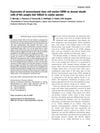TLDR Thy-1 protein helps improve blood flow and wound healing in the skin.
The research investigated the role of the GPI-Anchored Protein Thy-1/CD90 in wound healing, focusing on its impact on skin perfusion. The study involved 18 wild type (WT) mice and 20 Thy-1 knockout (Thy-1−/−) mice. Results showed that the absence of Thy-1 delayed wound healing, impaired re-epithelialization, and decreased blood perfusion during the healing process. However, by day 14, wounds closed similarly in both WT and Thy-1−/− mice. The study concluded that Thy-1 enhances wound healing by promoting blood perfusion in the wounded area, making it a potential target for wound therapy.
 7 citations
,
August 2022 in “Nature communications”
7 citations
,
August 2022 in “Nature communications” A specific group of slow-growing stem cells marked by Thy1 is crucial for skin maintenance and healing in mice.
23 citations
,
July 2022 in “Nature Cell Biology” Targeting THY1 can improve skin repair and healing.
 1160 citations
,
November 2018 in “Physiological Reviews”
1160 citations
,
November 2018 in “Physiological Reviews” The document concludes that better targeted treatments are needed for wound healing, and single-cell technologies may improve cell-based therapies.
 6 citations
,
September 2009 in “European journal of histochemistry”
6 citations
,
September 2009 in “European journal of histochemistry” CD90 is present on specific cells in dog hair follicles.
 12 citations
,
January 2021 in “Cell Transplantation”
12 citations
,
January 2021 in “Cell Transplantation” Baby teeth stem cells can help grow hair in mice.

Stem cells regenerate tissues and their behavior varies by environment, suggesting the hematopoietic system model may need revision.
 1 citations
,
November 2015 in “Indian Journal of Clinical Biochemistry”
1 citations
,
November 2015 in “Indian Journal of Clinical Biochemistry” The conference presented findings on how vitamin D levels, genetic factors, and lifestyle choices like smoking and yoga affect various health conditions and diseases.
 January 2000 in “Expert Opinion on Therapeutic Patents”
January 2000 in “Expert Opinion on Therapeutic Patents” The document highlights various patents for new compounds with potential treatments for multiple diseases, including cancer, hormonal disorders, and diabetes.







